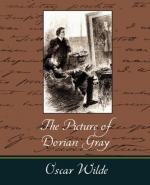“James, you really talk very strangely. Of course I watch over Sibyl.”
“I hear a gentleman comes every night to the theatre and goes behind to talk to her. Is that right? What about that?”
“You are speaking about things you don’t understand, James. In the profession we are accustomed to receive a great deal of most gratifying attention. I myself used to receive many bouquets at one time. That was when acting was really understood. As for Sibyl, I do not know at present whether her attachment is serious or not. But there is no doubt that the young man in question is a perfect gentleman. He is always most polite to me. Besides, he has the appearance of being rich, and the flowers he sends are lovely.”
“You don’t know his name, though,” said the lad harshly.
“No,” answered his mother with a placid expression in her face. “He has not yet revealed his real name. I think it is quite romantic of him. He is probably a member of the aristocracy.”
James Vane bit his lip. “Watch over Sibyl, Mother,” he cried, “watch over her.”
“My son, you distress me very much. Sibyl is always under my special care. Of course, if this gentleman is wealthy, there is no reason why she should not contract an alliance with him. I trust he is one of the aristocracy. He has all the appearance of it, I must say. It might be a most brilliant marriage for Sibyl. They would make a charming couple. His good looks are really quite remarkable; everybody notices them.”
The lad muttered something to himself and drummed on the window-pane with his coarse fingers. He had just turned round to say something when the door opened and Sibyl ran in.
“How serious you both are!” she cried. “What is the matter?”
“Nothing,” he answered. “I suppose one must be serious sometimes. Good-bye, Mother; I will have my dinner at five o’clock. Everything is packed, except my shirts, so you need not trouble.”
“Good-bye, my son,” she answered with a bow of strained stateliness.
She was extremely annoyed at the tone he had adopted with her, and there was something in his look that had made her feel afraid.
“Kiss me, Mother,” said the girl. Her flowerlike lips touched the withered cheek and warmed its frost.
“My child! my child!” cried Mrs. Vane, looking up to the ceiling in search of an imaginary gallery.
“Come, Sibyl,” said her brother impatiently. He hated his mother’s affectations.
They went out into the flickering, wind-blown sunlight and strolled down the dreary Euston Road. The passersby glanced in wonder at the sullen heavy youth who, in coarse, ill-fitting clothes, was in the company of such a graceful, refined-looking girl. He was like a common gardener walking with a rose.




